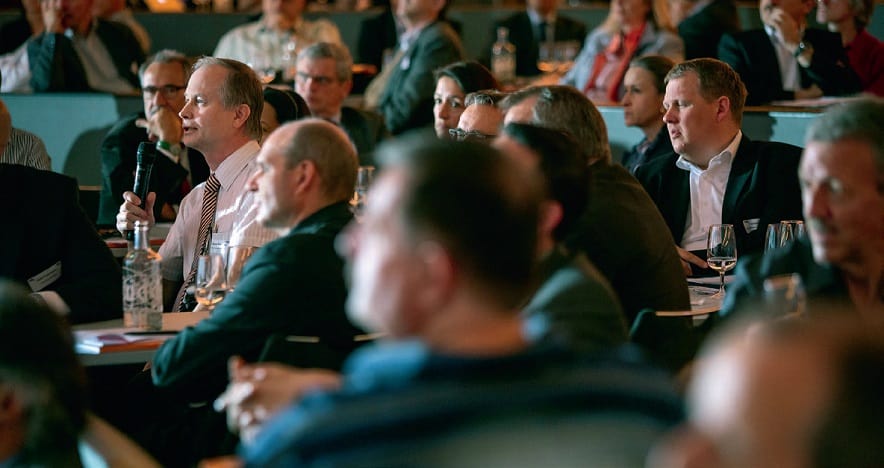What we do better
After two years of "exile" in Zurich, the SAQ returned to the federal capital: on June 4, the extremely lively Swiss quality scene presented itself in the renovated Kursaal Bern. The SAQ annual conference was held in cooperation with the Swiss Association for Quality and Management Systems SQS.

The self-confident slogan "What we do better" attracted over 350 participants from all over Switzerland to Bern. The weather gods offered a glorious sunny day exactly for the annual conference in the midst of the rainy weeks. But that was not the only thing that created a good atmosphere. The new conference ambience of the Kursaal with its view of Bern's old town once again proved to be an excellent venue for the "Swiss Quality Day".
"Swiss quality has many aspects: material and immaterial," said Andreas Rickenbacher, Bern's Director of Economic Affairs, in his welcome address to the conference. The precision and solidity of the products were one thing, the intangible framework conditions another. And it was precisely to these that Jean-Claude Biver, Chairman of the Board of Directors of the Hublot SA watch factory, devoted himself in a brilliant speech right at the beginning. As early as the 1970s, in the midst of the watch crisis, the Vaudois propagated that "handmade timepieces" would be successful because they "had a soul", as presenter Daniela Lager (SRF) pointed out in her introduction. Today, new sales records year after year prove him right.
"We inherited Switzerland"
"Without tradition, there is no future," Biver emphasized. But at the same time: "Without innovation, there is no future either. You need both." And Switzerland is very fortunate to have both. Biver's speech focused on tradition. "We have inherited Switzerland," he exclaimed, "received it as a gift. For each and every one of us, he said, it comes naturally; we have grown up with it. But, Biver said, "it's not normal at all. In 100 years, millions of Swiss have fought to give us what we have today. And that is unique in the world. There is no other country like Switzerland." All Swiss should understand this and make sure that this tradition is maintained and brought into the 21st century.
Switzerland, so tiny in area that it is barely noticed on the world map, is one of the largest exporting countries in the world. What does that mean? Biver: "We don't have a country like the French, with two seas. We had to build a country first. And
Unique in the world
where? We Swiss have one country: that's the world." To bring Switzerland into the world, he said, requires skill and brains. That's why Biver 1st called for the "best education policy" and "the best education system" - at all levels from toddler to university. Today, the country benefits from this: "Strong, best-educated youth means a strong nation. If the head is the strongest, it can conquer the world." And to "transport" the head, you need a healthy body. Switzerland was successful because 2. it had built the "best medical system in the world". And as the third point of the success concept, Biver stated: "Because we lack people, we have to receive workers, be open to new cultures, languages and religions." This requires a political system "that welcomes people - on the basis of stability, security and functioning laws".
With these three elements, Switzerland has built a foundation so that the country is at home on the globe. Switzerland as an exporting country has written countless success stories that were only possible because of this. Although it
A strong brand
Schindler has become the world's largest lift manufacturer. The chemical industry was already active in Japan and China 120 years ago. Although Switzerland does not grow coffee, it has managed to turn espresso into "Nespresso". And no luxury watch in the world would be bought if it didn't say "Swiss Made" on it. All this requires a concentrated innovative strength, art, culture and high quality, coupled with courage and optimism, says Biver: "We have inherited a country that makes all this possible for us. That is why we are not like the others. We are better."
Cows with a Swiss passport?
It is clear that the watch industry in particular has a great interest in protecting the Swiss brand. Watches should be considered Swiss if at least 60 percent of the manufacturing costs are incurred in Switzerland. This is what the Swissness bill, which will soon be voted on in the National Council, says. The law on trademark protection is controversial, and the debate has led to a number of curiosities. Under what conditions does a cow become a Swiss cow? Prof. Dr. Felix Addor of the Swiss Federal Institute of Intellectual Property is a specialist in questions relating to the Swiss brand.
The Swiss cross on products has become a "premium co-brand" over the past 20 years, said Felix Addor in his speech. Consumers around the world simply pay more for "Swissness" than for other products and thus also honor the tradition invoked by Jean-Claude Biver. In addition to top quality, reliability and precision, the general appreciation of Switzerland also plays a role. Attractiveness and trustworthiness made the country itself a "strong brand", which is directly transferred to products bearing the label. Today, over 5000 active brands rely on the "Swiss" co-brand. And the companies derive additional revenues of 20 and more percent from this. In 2009, the added value of Swissness amounted to CHF 4.7 billion, just under one percent of GDP.
However, Addor admitted that, as recent international surveys show, Switzerland's image has recently been on a "steady decline". He did not say anything about the reasons, but everyone in the room knew what it was all about. The other problem is the increase in "free riders" who want to polish up their brands with a "Swiss label": "'Bschissness' leads to a loss of image of Swissness", Addor warned. The revision of the law should finally bring legal certainty with clear provisions. On the one hand, the "Swiss cross" is to be legalized, on the other hand, it is to be clarified by law under which conditions products and services may be designated with "Switzerland": "Where Switzerland is on it, Switzerland should also be in it." Despite some scepticism, Parliament approved the Swissness bill on 21 June. Swiss trademark protection is now more enforceable.
Sika AG - at home in the world
Proof that companies are highly successful on world markets even without a Swiss cross in their corporate logo is Sika AG, headquartered in Baar. Jan Jenisch, Chief Executive Officer, is a traveler when it comes to globalization. For more than half of the year he visits his factories on site, especially the new investments in emerging markets, such as in 2012 the new factories in Chile, Colombia, Mongolia, Peru or Vietnam. Compared to the "mature markets" in Europe and North America, Sika already generated 37 percent of its net sales of CHF 4.8 billion in emerging markets in 2012.
It all started 103 years ago, says Jan Jenisch, with a product to accelerate the setting and hardening of mortar and concrete, which also seals at the same time. The breakthrough came in 1918 with the major contract to seal the 67 tunnels for the electrification of the Gotthard Tunnel. And today, in the construction of the new Gotthard tunnel, Sika is again involved as a supplier with almost identical tasks. Thanks to its innovations, the Group is now considered the world market leader in "sealing, bonding, damping, reinforcing and protecting". Its main customers are the construction industry
SpecialStrategy
and the manufacturing industry. "You can assume 80 percent of the time," says Jenisch, "that a Sika adhesive was used in your car." Today, Sika has 130 production and sales organizations in 80 countries. 95 percent of sales are realized outside of Switzerland.
Sika thus embodies globalization in its purest form. Opening up new geographic regions is part of the growth strategy. When building a new factory, any "export strategy" is dispensed with. It is realized as a "local investment" with local partners. Production is carried out using local raw materials and is consistently geared to local customer needs. Another success factor is the training of technical and managerial staff. "Here we have a great advantage as a Swiss company because we are much more open to accepting and integrating different cultures and people," said Jan Jenisch. The company relies heavily on local managers. In Latin America, there are just four "expads" sent from headquarters for every 2000 employees. This also shows: The Swiss group is literally "in the world" in Jean-Claude Biver's sense.
The Swissness Ambassadors
In addition to other specialist presentations and interviews on sustainability, risk and energy management in Swiss companies, F/A-18 pilot Marc Zimmerli presented a successful ambassador for the Swiss brand at the end of the conference: the Patrouille Suisse. The formation flights of the six aircraft inspire enthusiasm at events at home and abroad. The formation flights with distances of three to five metres at speeds of up to 1100 km/h require perfect teamwork, at visual height with visual fixed points and without electronic aids. The Patrouille Suisse impresses with precision, dynamics and 100 percent trust among the pilots - a more convincing calling card for "Swissness" is hardly conceivable.









